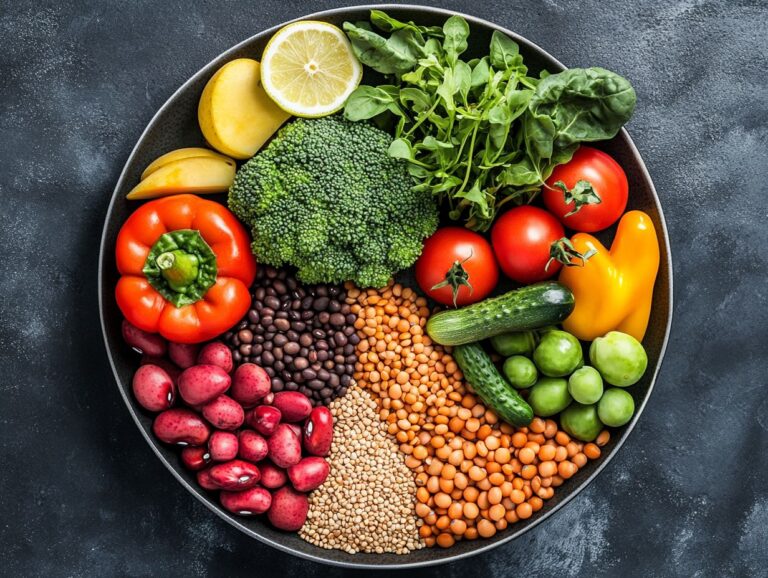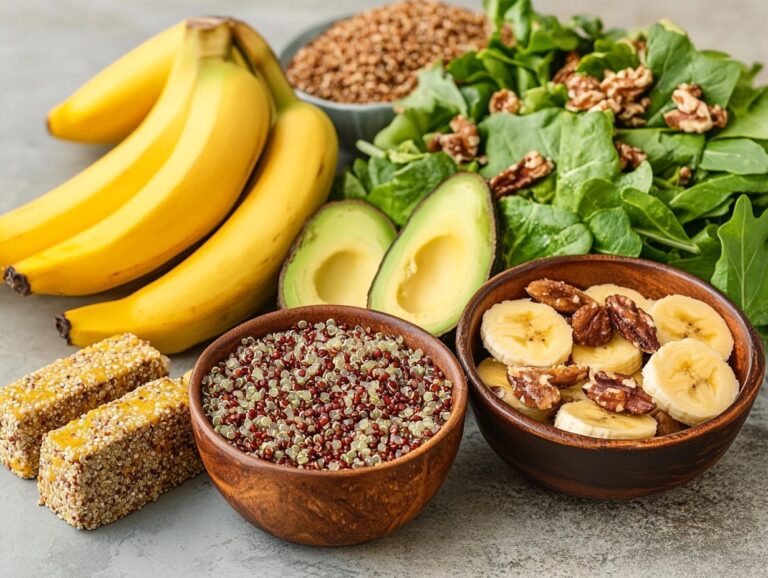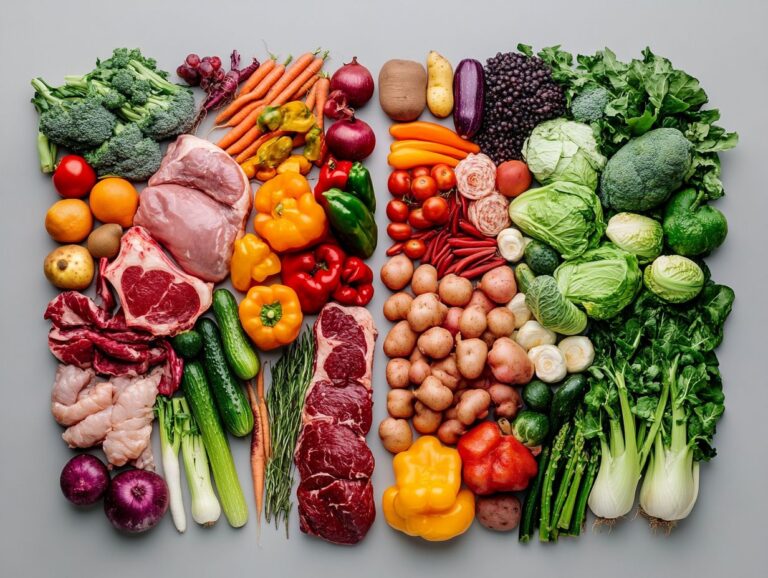The Vegan Elemental Diet is an innovative approach aimed at promoting gut health, restoring balance, and supporting overall well-being through the careful selection of plant-based foods. By emphasizing nutrient-rich ingredients and eliminating common irritants, this diet provides a pathway to bodily rejuvenation. Discover the numerous benefits of the Vegan Elemental Diet, learn how to implement its phases effectively, and explore which foods to embrace or avoid. Join us on a journey toward better health and vitality!
Key Takeaways:
- The vegan elemental diet is a plant-based approach to healing and detox that prioritizes whole, nutrient-dense foods.
- Benefits include improved gut health, essential nutrient intake, weight loss, and reduced inflammation.
- The diet consists of three phases and allows fruits, veggies, whole grains, and plant-based proteins while avoiding processed foods, animal products, and added sugars. It can be followed short-term or long-term for maintenance.
What Is The Vegan Elemental Diet?

The Vegan Elemental Diet is an advanced dietary approach designed to enhance gut health through the use of predigested nutrients and easily absorbed meal replacements.
This diet is particularly beneficial for individuals with various health conditions, such as inflammatory bowel disease (IBD), small intestinal bacterial overgrowth (SIBO), and food sensitivities.
By facilitating the healing of the digestive tract while minimizing gastrointestinal issues, the elemental diet provides essential nutrients in a completely plant-based formulation, making it suitable for vegans and those seeking dietary strategies to improve overall health.
What Are The Benefits Of The Vegan Elemental Diet?
The Vegan Elemental Diet provides numerous nutritional benefits that can greatly improve gut health and overall well-being, particularly for individuals suffering from chronic fatigue, abdominal pain, or other gastrointestinal issues.
By offering easily digestible, predigested nutrients, this diet not only helps manage symptoms but also supports the body in recovering from harmful digestive experiences.
This makes it an effective option for those considering semi-elemental diets as part of their nutritional regimen.
1. Restores Gut Health
The primary benefit of the Vegan Elemental Diet is its ability to restore gut health by using predigested nutrients that lighten the load on the digestive system. This is especially crucial for individuals suffering from conditions such as inflammatory bowel disease (IBD) and irritable bowel syndrome (IBS).
By minimizing the workload on a compromised digestive tract, the Vegan Elemental Diet enhances nutrient absorption and reduces inflammation simultaneously. The liquid form of the diet delivers essential amino acids, carbohydrates, and fats in a manner that can be easily absorbed by those experiencing severe gastrointestinal distress.
Additionally, incorporating probiotics into the regimen is vital, as they promote the growth of healthy gut flora, further facilitating recovery. Moreover, certain nutritional interventions—such as high-fiber plant-based foods and adequate hydration—serve as valuable complements to the diet, improving microbial diversity and alleviating gut irritations.
2. Provides Essential Nutrients
The Vegan Elemental Diet is specifically designed to supply nutrients that are frequently lacking in other diets, addressing common nutrient deficiencies with key components such as l-arginine, l-glutamine, and dextrose, all of which are essential for overall health and recovery.
3. Promotes Weight Loss
Weight loss is a significant benefit of the Vegan Elemental Diet, as it encourages individuals to make dietary changes that promote lower caloric intake and improve metabolic health, thereby reducing health risks associated with obesity.
This diet emphasizes whole plant foods with high nutrient density, providing essential vitamins and minerals while helping to curb cravings for processed foods high in sugar and unhealthy fats. The focus on fruits, vegetables, legumes, and whole grains naturally leads people to choose lower-calorie options.
As a result, individuals are more likely to adopt healthier eating patterns that contribute to weight reduction and a sustainable lifestyle. Additionally, these dietary changes can help reduce inflammation and increase energy levels, creating a more favorable environment for maintaining a healthy weight in the long term.
4. Reduces Inflammation

The Vegan Elemental Diet offers anti-inflammatory effects that can help reduce inflammation linked to various health issues, such as chronic fatigue and digestive discomfort, ultimately enhancing quality of life.
By avoiding allergens and irritants through a well-structured, individualized regimen, individuals may experience a significant reduction in symptoms associated with chronic inflammation. This improvement can lead to increased energy levels and a more positive mood, fostering a greater ability to engage in daily activities.
Following the initial phase of the diet, food reintroduction strategies can be implemented to help identify specific triggers while gradually increasing dietary variety. This approach allows individuals to maintain the benefits of reduced inflammation while encouraging lifestyle changes that support ongoing health.
How To Follow The Vegan Elemental Diet?
The Vegan Elemental Diet is followed in a structured manner, consisting of three phases: the elimination phase, the reintroduction phase, and the maintenance phase.
Ideally, all three phases should be conducted under clinical supervision to maximize benefits and minimize health risks.
1. Elimination Phase
The elimination phase of the Vegan Elemental Diet is crucial because it helps identify and remove foods that may cause sensitivities or exacerbate gastrointestinal conditions, establishing a clear baseline for health.
During this phase, participants remove specific food groups, including gluten, dairy, and common allergens, allowing them to closely monitor their body’s responses and more easily identify problematic foods.
This process enhances the understanding of individual reactions to specific foods and prepares participants for making informed dietary choices in the future.
As part of this phase, a detailed food diary will be maintained to track symptoms and correlate them with the foods consumed, aiding in the identification of gastrointestinal distress.
Ultimately, this elimination phase supports the achievement of long-term health and wellness goals.
2. Reintroduction Phase
During the reintroduction phase, individuals gradually reintroduce eliminated foods one at a time to monitor their effects. This process is essential for understanding personal food sensitivities and can be complemented by probiotic supplementation to promote optimal gut health.
This meticulous approach allows individuals to identify specific trigger foods that may cause discomfort or adverse reactions, making it a crucial step toward dietary awareness. Each food is typically reintroduced over several days, providing enough time to observe any changes in digestion, energy levels, or overall well-being.
Incorporating probiotics can support this transition by enhancing gut flora, further aiding digestion, and potentially reducing inflammation. This combination enables individuals to develop a more varied and nutritious diet while maintaining comfort and balance in their digestive system.
3. Maintenance Phase
The maintenance phase of the Vegan Elemental Diet emphasizes the long-term sustainability of a balanced diet by incorporating non-sensitive foods and addressing any nutritional deficits identified in previous phases.
This phase focuses on the importance of healthy plant-based foods and the role of gut health through the inclusion of prebiotics and probiotics. Regularly including foods rich in vitamins B12, D, and omega-3 fatty acids can help maintain proper nutritional status while supporting a healthy microbiome.
It is essential to continue monitoring for signs of imbalance in dietary intake during this phase.
What Foods Are Allowed On The Vegan Elemental Diet?

The Vegan Elemental Diet is designed to include a variety of nutrient-rich foods that align with its principles.
This diet allows for the consumption of plant-based proteins, whole grains, and an abundance of nutrient-dense vegetables and fruits, all of which support gut health and contribute to an individual’s overall well-being.
1. Fruits and Vegetables
Fruits and vegetables are essential components of the Vegan Elemental Diet, offering vital dietary fiber, vitamins, and minerals that support digestive health and overall bodily function.
This diet includes a variety of nutrient-dense options, such as leafy greens like kale and spinach, which are rich in antioxidants and plant-based iron, both of which are crucial for maintaining energy levels.
Cruciferous vegetables, such as broccoli and Brussels sprouts, contain glucosinolates—compounds known to aid in detoxification and support gut flora.
Fruits like berries and bananas are also integral to this diet, as they provide prebiotics that nourish beneficial gut bacteria, thereby enhancing digestion.
Additionally, the high water content of cucumbers and oranges promotes hydration and can improve bowel regularity, making these foods essential for cultivating a healthy gut microbiome.
2. Whole Grains
Whole grains are a vital source of complex carbohydrates and fiber in the Vegan Elemental Diet, providing long-lasting energy and aiding in digestion.
Various types of whole grains, such as quinoa, brown rice, barley, and farro, are rich in essential vitamins, minerals, and antioxidants, all of which are crucial for maintaining proper metabolic functions and regulating blood sugar levels. Their nutritious profiles also support the digestive system due to their high fiber content, which assists in forming a healthy microbiome essential for regular and comfortable bowel movements.
Therefore, whole grains are a critical component of the Vegan Elemental Diet, supporting daily energy levels and offering long-term health benefits.
3. Plant-based Proteins
Plant-based proteins are a crucial component of the Vegan Elemental Diet, providing essential amino acids and nutrition vital for maintaining muscle health and overall well-being.
This diet includes a diverse array of protein sources, such as lentils, chickpeas, quinoa, and hemp seeds, each offering unique benefits and helping to address issues like nutrient deficiencies and food sensitivities.
- Lentils are rich in both protein and fiber, which support muscle repair and promote digestive health, respectively.
- Quinoa, a grain-like superfood, is considered a complete protein because it contains all nine essential amino acids, making it an excellent choice for a vegan diet and helping to prevent nutrient deficiencies.
- Chickpeas are not only high in protein but also have a low glycemic index, which can help regulate blood sugar levels.
- Additionally, hemp seeds are packed with protein and provide omega-3 fatty acids, contributing to a well-rounded nutritional profile.
Together, these protein sources create a well-rounded nutritional profile that ensures individuals following a Vegan Elemental Diet receive sufficient amino acids and minimize health risks associated with nutrient deficiencies.
What Foods Should Be Avoided On The Vegan Elemental Diet?
The health benefits of the Vegan Elemental Diet are maximized by avoiding processed foods, animal products, and added sugars, as these can negatively affect gut health and overall well-being. Avoiding these items helps manage gastrointestinal issues such as irritable bowel syndrome (IBS) and conditions like Small intestinal bacterial overgrowth (SIBO).
1. Processed Foods

Processed foods can lead to various health problems, including abdominal pain and chronic fatigue, due to their detrimental effects on gut health.
Processed foods, which are often rich in additives and preservatives, are not recommended on the Vegan Elemental Diet due to their potential health risks and negative impact on gut health.
These foods typically contain high levels of refined sugars, unhealthy fats, and artificial ingredients that can disrupt normal digestive functioning. The presence of these synthetic materials can hinder the body’s ability to absorb essential nutrients, leading to various gastrointestinal issues such as bloating and inflammation. This can exacerbate conditions like inflammatory bowel disease (IBD) and irritable bowel syndrome (IBS).
Additionally, most processed foods are low in fiber, which is crucial for maintaining optimal digestive health. Consequently, these products can contribute to dysbiosis, an imbalance of gut bacteria that may cause further digestive discomfort and diminish overall health, rather than supporting a healthy gut microbiome.
2. Animal Products
The Vegan Elemental Diet prohibits any animal products due to ethical concerns and potential health repercussions related to inflammation and food sensitivities. This exclusion is particularly beneficial for individuals with conditions such as Crohn’s disease, Ulcerative colitis, and Eosinophilic esophagitis, where animal products may exacerbate symptoms.
Ethical issues arise from the negative impact of industrial farming on both animal welfare and the environment. By adopting a plant-based approach, individuals can help reduce the demand for animal exploitation and the carbon footprint associated with livestock production.
From a health perspective, many people experience decreased inflammation, improved digestion, and a lower risk of chronic diseases by eliminating dairy and meat from their diets. This underscores the importance of understanding how a vegan diet can enhance overall health in addition to its ethical implications. For individuals with conditions like Eosinophilic gastroenteritis, such dietary changes are crucial for managing symptoms and preventing flare-ups.
3. Added Sugars
Added sugars are not included in the Vegan Elemental Diet because they can cause inflammation and exacerbate the health risks associated with various chronic conditions. Often referred to as unhealthy sweeteners, added sugars can raise blood sugar levels while disrupting the balance of the gut microbiome. This is particularly important for individuals dealing with conditions like Small intestinal bacterial overgrowth (SIBO) or irritable bowel syndrome (IBS).
This disruption can lead to digestive issues and improper nutrient absorption. For individuals aiming to improve their health through a plant-based lifestyle, it is important to reduce the consumption of added sugars and consider incorporating probiotics such as Lactobacillus and Bifidobacterium to support gut health.
When included in the diet, these sugars can create an environment that promotes the overgrowth of pathogenic bacteria, thereby decreasing overall gut function. This concern is particularly relevant in a Vegan Elemental Diet, where promoting gut health is essential to maximizing the benefits of plant-based nutrition.
Consequently, intentionally excluding added sugars is necessary to ensure that health improvements are sustainable and that digestive systems function optimally.
How Long Should Someone Follow The Vegan Elemental Diet?
It is essential to consider individual health goals and potential health risks when determining the duration of the Vegan Elemental Diet. Consulting with a healthcare provider, such as those at the Ruscio Institute of Functional Health, can help tailor the diet to individual needs.
The duration of the Vegan Elemental Diet varies significantly based on individual health goals. Typically, it consists of short-term phases lasting 1 to 2 weeks, long-term phases lasting 3 to 4 weeks, and ongoing maintenance phases. Including elements from other diets, such as the Mediterranean diet, can enhance its effectiveness.
These phases are designed to ensure sustained health benefits while minimizing potential health risks.
1. Short-term (1-2 Weeks)
The short-term phase of the Vegan Elemental Diet lasts for 1 to 2 weeks and is designed to provide immediate benefits such as detoxification and relief from acute gut-related symptoms. This can be particularly beneficial for individuals dealing with Crohn’s disease, Ulcerative colitis, or Eosinophilic esophagitis.
During this phase, individuals following the Vegan Elemental Diet can expect to experience positive changes in their bodies, including decreased bloating, increased energy levels, and improved skin health.
These improvements are attributed to the focus on easily digestible plant-based nutrients and predigested nutrients, which play a crucial role in eliminating toxins that may accumulate in the body. By minimizing complex foods, users often report a significant reduction in gastrointestinal discomfort, including conditions like abdominal pain and inflammation.
The simplicity of this phase enhances nutrient absorption and allows the body to concentrate on its natural self-healing processes. Clinical supervision during this phase can ensure that dietary changes are appropriate and beneficial.
2. Long-term (3-4 Weeks)
The long-term phase of the Vegan Elemental Diet lasts for 3 to 4 weeks and is designed to enhance health in a sustainable way while enabling individuals to make lasting dietary changes that promote gut health. This phase can help manage chronic conditions such as inflammatory bowel disease (IBD) and irritable bowel syndrome (IBS).
This crucial phase not only solidifies positive lifestyle changes but also encourages individuals to seek out and incorporate nutrient-dense plant-based foods essential for gut health.
By increasing their awareness of eating habits, individuals can gradually transition from processed foods to whole foods that nourish the microbiome. A continued commitment to mindful food choices during this phase can lead to improved energy, mood, and a healthier relationship with food. This approach can significantly reduce health problems like chronic fatigue and digestive tract issues.
Consequently, the long-term phase acts as a catalyst for developing a more holistic approach to health, offering benefits that extend beyond mere dietary changes.
3. Maintenance (Ongoing)
The maintenance phase of the Vegan Elemental Diet represents an ongoing commitment to a balanced diet that ensures the health benefits achieved during previous phases are sustained and effectively managed. This phase is crucial as it serves as a bridge to a lifestyle where the pleasures of a richly textured plant-based diet can be fully embraced while safeguarding the benefits gained earlier. Probiotics supplementation with strains like Lactobacillus, Bifidobacterium, and Saccharomyces boulardii can further support gut health during this phase.
A balanced approach not only preserves nutritional advantages but also protects against declining health by continually supporting the body. During this phase, consuming an appropriate amount of whole foods, along with grains, legumes, and healthy fats, creates an environment in which the body can be adequately nourished, ensuring sufficient energy levels and promoting overall health. Incorporating meal replacement options and considering semi-elemental diets can also help maintain nutritional balance.
The focus of this extended phase encourages practitioners to remain mindful of their dietary choices and helps them understand the impact of their diet on their health in both the short and long term.





